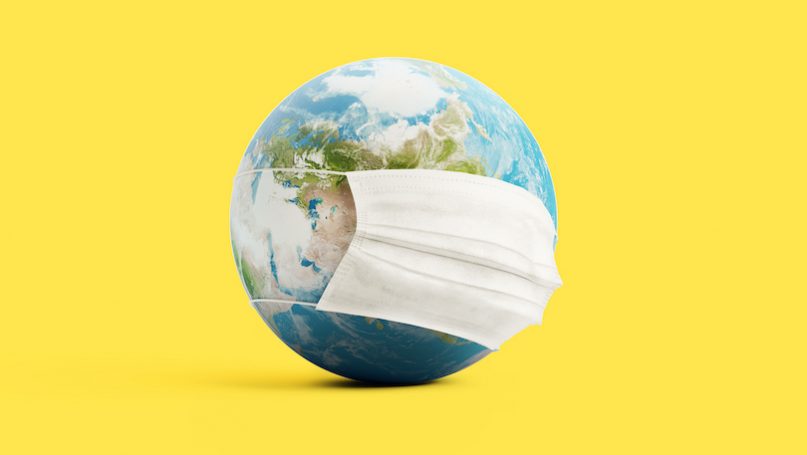
As we enter 2022, the Omicron variant is a stark reminder of the fragility of declaring one nation to be ‘Covid-free’ or ‘post-pandemic’ before the rest of the world is able to say the same. Denmark, Portugal, and other highly vaccinated nations like the UAE and Iceland were all preparing to live with Covid before Omicron hit, and they still can. However, learning to live with Covid must come with the acceptance that the pandemic stage is not over and endemicity is still far down the road. It is possible to say we will be in this pandemic for another two years while also saying that there are steps we can take now to return to a sense of normality.
Emerging from a global pandemic that has killed over 5 million people is not an easy task. In this next stage of the pandemic, the science and the tools are clearer but positions at both the personal and the governmental level have hardened. Covid fatigue has inevitably set in, and an apathetic impulse is strong and understandable as the months wear on.
Booster campaigns are well underway and likely to intensify in wealthy nations as they serve the national interest and the primary function of the state in protecting its citizens. As the boosted population in developed nations increases, the percentage of those fully vaccinated in developing nations may not reach the levels of those in the West until 2023. The WHO has already warned that increased booster rollouts may prolong the pandemic and lead to further vaccine inequities.
To further compound this divide, most of the Global South has thus far been vaccinated with non-mRNA vaccines like China’s Sinopharm and Sinovac, Russia’s Sputnik V, and the UK’s AstraZeneca. These vaccines were less effective overall in tackling the original Covid-19 strain but have provided critical vaccine diplomacy for both China and Russia to influence states in their immediate spheres of influence and further afield.
A notable example is China’s growing influence in Latin America, which recently has been receptive to overtures from Beijing. In Nicaragua, the Ortega government formally ended its relations with Taiwan and in return received a million Sinopharm vaccines from China. Given US-Nicaragua relations are strained as a result of the recent election and alleged human rights violations, Beijing provides an easy ‘no strings attached’ route for Nicaraguans to begin to envision a post-Covid world.
Despite the expected continued use of Russian and Chinese-made vaccines in nations from Cambodia to Nicaragua, the most effective vaccines so far have been the mRNA platforms developed by Moderna and Pfizer-BioNTech. In vaccinating the world through 2022, these vaccines offer the best hope to move collectively to a post-pandemic period that can be managed without rushed and reactionary travel bans, as well as other economic disruptions.
The onus is now on the WHO and prominent states like the US and the UK to place a greater emphasis on the mRNA vaccines in the push to vaccinate the rest of the world. This will not be an easy task when it comes to logistics as well as vaccine hesitancy, but it is a challenge that not only will help those in need but provide a propaganda victory for the West in its geostrategic battle for influence with China.
The course of the pandemic is now a policy choice that can either be prolonged by entrenched vaccine nationalism or shortened by a focus on the collective global goodwill. 2022 is likely to be a critical juncture and an important gauge of the soft power of both the US and China, not just on pandemic related matters but on other areas of strategic competition.
While the pandemic continues, management and transition to endemicity is within reach and there are many reasons for optimism. In 2022, the most potent tools against Covid-19 will be on full display, including the mRNA vaccines, a range of emerging antiviral treatments, and the US Army’s multi-variant vaccine (among others) will continue development and trials. It is one thing to have these tools, but policymaking, logistics, and the national interest are all variables that like Covid’s variants, will undoubtedly emerge and cause headaches.
Donating vaccines to developing nations is arguably not as great a political selling point as vaccinating and boosting one’s own citizens. However, this point will need to be made by those nations that are vaccinated and boosted to high rates, with the confidence of a new dawn that has afforded us the time and the capabilities to make it happen.
Further Reading on E-International Relations
- The New Normal: Trauma Informed International Practices During COVID-19
- Opinion – The UK’s Complicated and Contradictory COVID-19 Moment
- Opinion – COVID-19’s Wider Impact on Mexican Society
- Opinion – Covid-19 and Africa
- Opinion – Multilateralism as Panacea for COVID-19
- Opinion – Post-COVID-19 Climate Change Politics